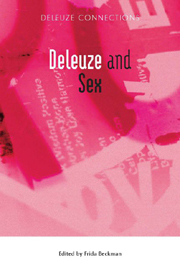Book contents
- Frontmatter
- Contents
- Acknowledgements
- Introduction: What is Sex?: An Introduction to the Sexual Philosophy of Gilles Deleuze
- 1 Alien Sex: Octavia Butler and Deleuze and Guattari's Polysexuality
- 2 Heterotica: The 1000 Tiny Sexes of Anaïs Nin
- 3 Haemosexuality
- 4 Disability, Deleuze and Sex
- 5 Tongue and Trigger: Deleuze's Erotics of the Uncanny
- 6 (Hetero)sexing the Child: Hans, Alice and the Repressive Hypothesis
- 7 The ‘Non-Human Sex’ in Sexuality: ‘What are Your Special Desiring-machines?’
- 8 Deleuze and Selfless Sex: Undoing Kant's Copernican Revolution
- 9 A Preface to Pornotheology: Spinoza, Deleuze and the Sexing of Angels
- 10 Encounters of Ecstasy
- 11 Beyond Sexuality: Of Love, Failure and Revolutions
- Notes on the Contributors
- Index
9 - A Preface to Pornotheology: Spinoza, Deleuze and the Sexing of Angels
Published online by Cambridge University Press: 12 September 2012
- Frontmatter
- Contents
- Acknowledgements
- Introduction: What is Sex?: An Introduction to the Sexual Philosophy of Gilles Deleuze
- 1 Alien Sex: Octavia Butler and Deleuze and Guattari's Polysexuality
- 2 Heterotica: The 1000 Tiny Sexes of Anaïs Nin
- 3 Haemosexuality
- 4 Disability, Deleuze and Sex
- 5 Tongue and Trigger: Deleuze's Erotics of the Uncanny
- 6 (Hetero)sexing the Child: Hans, Alice and the Repressive Hypothesis
- 7 The ‘Non-Human Sex’ in Sexuality: ‘What are Your Special Desiring-machines?’
- 8 Deleuze and Selfless Sex: Undoing Kant's Copernican Revolution
- 9 A Preface to Pornotheology: Spinoza, Deleuze and the Sexing of Angels
- 10 Encounters of Ecstasy
- 11 Beyond Sexuality: Of Love, Failure and Revolutions
- Notes on the Contributors
- Index
Summary
The angel is that which unceasingly passes through the envelope(s) or container(s), goes from one side to the other, reworking every deadline, changing every decision, thwarting all repetition. Angels destroy the monstrous, that which hampers the possibility of a new age … They are not unrelated to sex.
(Irigaray 1993b: 16)I saw in his hand a long spear of gold, and at the iron's point there seemed to be a little fire. He appeared to me to be thrusting it at times into my heart, and to pierce my very entrails … The pain was so great, that it made me moan; and yet so surpassing was the sweetness of this excessive pain, that I could not wish to be rid of it.
(St Teresa of Avila 2004: xxix)Libido est etiam cupiditas et amor in commiscendia.
(Spinoza)Angelic Machinery/Wings of Desire
To come and to become. Two infinitives whose underlying sense in English is conventionally connected but differentiated, in that becoming, at least outside the meticulous play of philosophical argument, is invariably transitive. To become is to become something or someone, or to gain or lose in some quality such as strength or ambition or affection or disillusion or sexual excitation. To come, on the other hand, may well be used transitively in certain contexts, but also has a very specific and intransitive quality when describing the experience of orgasm. To come, then, or more actively, to express the rich and vivid somatic experience ‘I am coming’, whether silently or vocally, is to express the moment of being on a precipice and of becoming precipitous simultaneously.
- Type
- Chapter
- Information
- Deleuze and Sex , pp. 174 - 199Publisher: Edinburgh University PressPrint publication year: 2011

